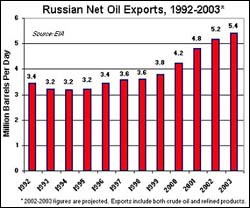 OIL - STILL FUELING THE FUTURE
OIL - STILL FUELING THE FUTURE |
Despite the Russian government intention to diversify
the economy, Oil is and will for some time to
come remain the jewel in the crown of Russia's
economic development. In fact, oil was one of
the determining factors in the country's recovery
from its 1998 financial crisis. True, plans have
been put forward in Russia to diversify the economy
away from the energy (oil) sector by shifting
the tax burden from manufacturers to extractors
by pumping up taxes on energy exports, but for
the time being this is future talk.
In 2002, energy resources made up 56.4 percent
of Russia's overall exports to Western countries.
Russia is today's second-largest exporter of oil
in the world. Total revenues from oil exports
amount to no less than one quarter of Russian
government revenues. Russian hydrocarbon production
facilities such as the one in the Tyumen Oblast
in West-Siberia, the oil fields in the Caspian
Sea or the Far Eastern reserves are only a stone
throw away from both the European and Asian markets.
And, the United States' move to upgrade Russia
from a second-rated player to vital ally surely
has more than a few political reasons. True, Russia
currently only accounts for a pitying 0.77% of
US oil imports, but this is about to change. A
start was made with the Russia-US "energy
dialogue" launched in May 2002 when US President
George Bush visited Moscow. The US is starting
to realise that, next to the Middle Eastern huge,
but increasingly unstable powerhouses, Russia
has more oil reserves than any country or region
can compare with. Russian oil reserves are estimated
at 49-55 billion barrels or 9% of the world's
proven oil reserves.

In fact, quarter one of 2002 saw for the first
time since the 1980s, Russia overtaking Saudi-Arabia
to regain its position as the world's leading
oil producer. This however did not come naturally.
During the 1990's, Russia's oil future looked
bleakish with production volumes plummeting down
from nine to six million barrels a day. With a
steady stream of oil orders from the formerly
planned economy coming to a standstill, reform
of the industry was inescapable. The aim of the
reform was the privatization of completely inefficient
state-owned enterprises. This reform was accompanied
by the much-needed change of the industry's structure.
Several large, vertically integrated oil companies,
like Yukos,
LUKoil, Sibneft and Tyumen Oil Co. (or TNK), now
dominate an industry formerly ruled by the Soviet
Ministry of the Oil Industry.
Important was the separation of pipeline transport
from potentially competitive activities, such
as the extraction, processing and marketing of
oil and oil products. In practice, there is room
for competition only in the export of Russian
oil and oil products. Exports to foreign markets
are somewhat restrained. Today, Transneft is the
state-owned oil distribution monopoly. The company
has full control over pipeline transportation
in Russia, but not for long if it is up to Russia's
overtly productive and profitable oil giants.
Very much against the will of OPEC, the non-member
Russia's oil output is growing for the fifth straight
year. The World Bank estimates that $6 billion
to $10 billion in annual investment is needed
to increase oil production to the levels Russia's
energy policy foresees by 2010. Domestic oil producers
cannot be expected to pitch in more than 50% of
this amount, which did not prevent Russia from
increasing its oil output by 9.9% in 2002 and
the expected 10 per cent in 2003 from the current
level of 8 million bpd. 4 million bpd is exported
abroad through pipelines, ports, rail and other
routes. Yukos Oil, which overtook its main rival
LUKoil as No.1 Russian oil producer for the first
time in monthly crude production, plans to boost
exports by 40% in 2003, including to China and
the US.
|
Contrary to their Middle Eastern rivals, however,
pipeline bottlenecks are hampering Russian producers'
oil export and causing cost increases. Transneft
can only handle 3.5 million bpd and is not always
willing to serve the producers' needs. The oil
majors have to find alternative routes to lucrative
western markets. Indeed, limited export facilities
with an unbridled desire to boost exports to foreign
markets are resulting in rising capital expenditures
by the Russian oil majors. These expenses translate
into investments in infrastructure and transportation,
like the LUKoil-Conoco project to transport crude
oil through the Arctic waters and Yukos' plan
to build pipelines to China and through the Balkans
to the Adriatic Sea.

Mikhail Khodorkovsky, CEO
of Yukos Oil
Mikhail
Khodorkovsky, CEO of the immensely successful
Yukos Oil, stresses, "…the key component
for any Russian company remains transportation
costs and markets. Our marketing arm is able to
maintain exports at a high level, and the fact
that we have opted for a strategy of negotiating
long term contracts has given us the opportunity
to acquire some very attractive segments of the
market".
In any case, despite government imposed export
tariffs and cuts and so on, the advantages of
exports are too high for Russian exporters. If
the truth be told, Russia's oil industry benefited
substantially from this crisis, which saw the
devaluation of the rouble and consequently also
a substantial lowering of production costs. The
difference between domestic and export prices
- the fact that Russian oil prices are indeed
just over half of the global market prices - plus
the guarantee of hard currency payment for exports
are too tempting. Either they will export crude
or refined oil products. According to Riabov,
General Director of the Oil Refinery Association,
it is important to process domestically, "and
then export finished products in order to attract
foreign currency into the country. This is why
our tax legislation is now being improved to make
it the same for domestic as well as foreign investors
and to have a guarantee for raised funds."
How attractive then is the Russian oil industry
to foreign investors? Well, certainly interesting
enough for BP to strike a record $6.75 billion
deal with TNK in February 2003. The deal created
a global top 10 oil producer, valued at $18.1
billion. This landmark investment of the British
giant, equalling some 1.5% of Russia's GDP, into
Russian oil could easily ignite a rush of other
global oil majors into the Russian Federation.
Up until the BP/TNK deal was signed and brought
serious competition to the Russian market (which
had been dominated by LUKoil and Yukos), though,
the level of direct investment in Russia's oil
industry had been a mere $4.5 billion and much
below what is needed for Russia to reach its future
production objectives. In fact, this capital was
primarily invested in high-risk and pricey offshore
projects in the pacific and the Caspian Pipeline
Consortium, which aims to connect Caspian fields
to Black Sea ports. Russia's ailing service sector
does provide opportunities to foreign technology,
equipment and service providers. Some large international
service companies (e.g. Schlumberger, Halliburton,
Parker Drilling, Pride Foralsol) have recently
signed major contracts with Russian oil majors.
Still, a more interesting Russian oil investment
climate will have to include a still missing fully
transparent legal infrastructure, including a
'production-sharing agreement' law.
|

